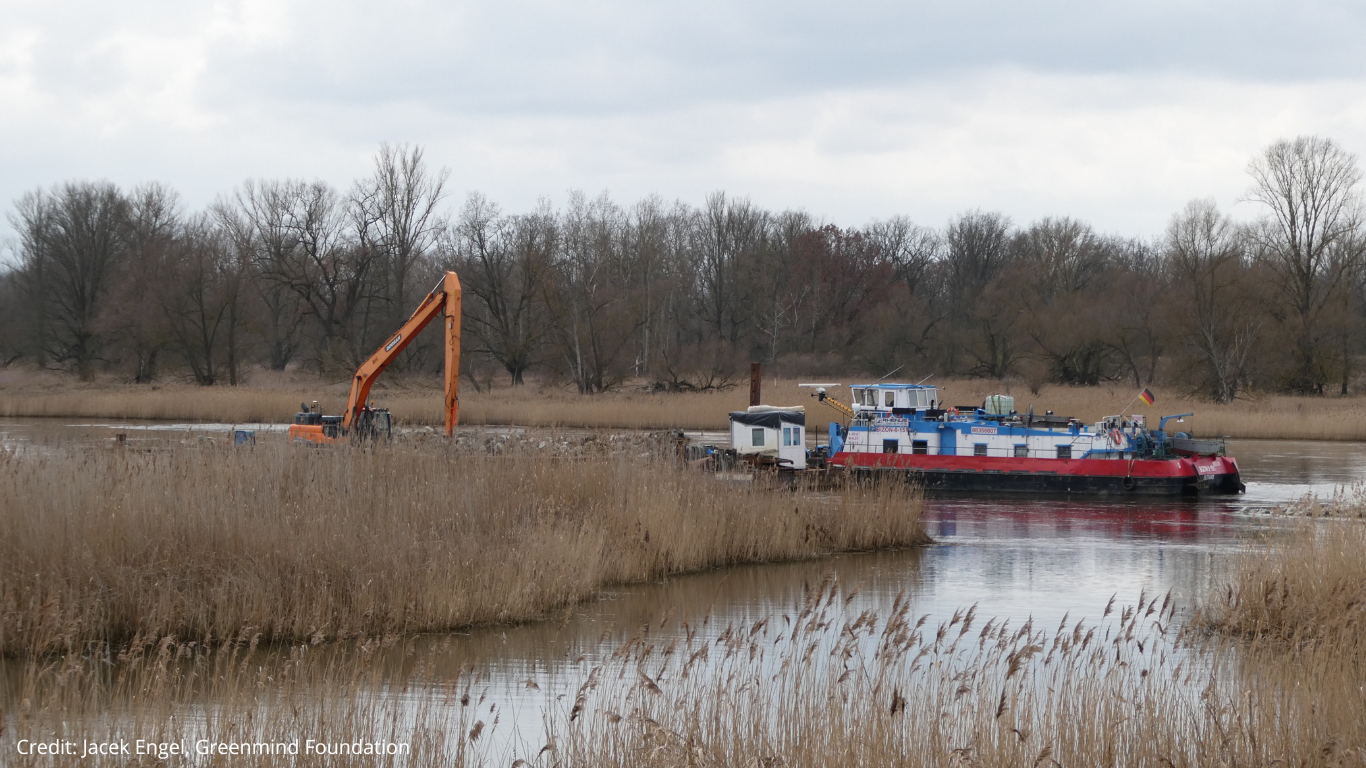The Supreme Administrative Court of Poland suspended the canalization works on the Odra river
Is the State Water Holding Polish Waters above the law?

Abstract:
●
There is evidence that despite the
verdict of the Supreme Administrative Court of Poland (NSA), Wody Polskie and their subcontractors are continuing regulatory work on the Oder.
[Watch the video available below]
●
The verdict of the NSA is a great success for the natural diversity of the Oder landscape, as well as for the people living along the river.
● The decision of the NSA is a victory for Polish and German NGOs (Naturalists Club, Eko-Unia Association, SOT, N., Deutscher Naturschutzring, BUND, NABU), demanding that the works be stopped as harmful to the ecosystem of the river, which is particularly weakened after the ecological disaster that hit the Oder in July and
August 2022.
A brief history of lawlessness
The NSA's order of the 7th of March this year leaves no doubt. Wody Polskie should stop the regulatory works on the Oder. The justification states, among other things: "However, in the light of the case at hand, the Supreme Administrative Court considered that the suspension of the execution of the environmental decision, in the case of the ongoing implementation of this project, implies a real obligation to suspend the works in progress as part of its implementation. In the opinion of the Supreme Administrative Court, the adoption of a different position would not only be contrary to the principles of environmental law, but would also mean depriving the parties of their right to a court, which, having regard to the principle of a democratic state of law, cannot constitute a façade institution."
Thus, the NSA dismissed the complaint of the State Water Holding Company Wody Polskie (PGW WP) against the decision of the Voivodship Administrative Court (WSA) on 9 December 2022, which had already ordered the suspension of the works.
"This is a success, but this is what normality should look like, given the law" comments Ewa Leś, an expert for Governance for Transboundary Freshwater Security from the Save the Rivers Coalition and Coalition Clean Baltic, - "Let's remember that the Oder is a transboundary river of three countries that should work on its best condition, not devastation. There is also a need for coordinated efforts between HELCOM [1] and the International Commission for the Protection of the Oder River against Pollution [2] in the future, especially considering the source-to-sea approach and the role of healthy rivers in achieving good environmental status in the Baltic Sea" she continues.
Here it is worth mentioning that the WSA's decision in December to stop the works should have been enforced when it was issued. In spite of this, Wody Polskie continued to regulate, citing the final Permits for the Realisation of the Investment. At the same time, WP filed a complaint and decided to wait for the settlement of the NSA. This ruling has just been announced. The NSA upheld the decision of the lower instance, which means an immediate injunction to stop the works.
Despite this, the materials attached to this information clearly show that Wody Polskie is breaking the law and disregarding the verdict of the NSA, which is no longer subject to appeal.
This is outrageous, especially in the context of what the Oder River went through in August 2022 and in view of the still high salinity levels in the river and the presence of 'golden algae' in it.
Credit: Jacek Engel, Greenmind Foundation
"The works must be stopped immediately. Especially after the ecological catastrophe on the Oder in 2022, more attention must be paid to the transboundary effects of construction activities on protected species and habitats. The ecological processes and resilience of the river must be prioritised" - says Krzysztof Smolnicki, from the Coalition "Time for the Oder" and the Foundation for Eco-development.
Radosław Gawlik, from the Eko-Unia Association (Poland), is not optimistic: "It is likely that the current Polish government and water administration will disregard the decisions to stop the works to channel the Border Odra. The prosecutor's office subordinated to the government will not do anything in this case either. There will be a chance for a decision of the European Court of Justice. This worked for the Polish government in the case of deforestation in the Białowieża Forest and the Czech government's complaint about the environmental impact of the Turów open pit."
***
NOTES
The Save the Rivers Coalition and the Coalition "Time for the Oder" are monitoring this issue and are available for any information and materials.
The above Press note comes from Save the Rivers and Coalition "Time for Oder", written by Rafał Rykowski.
[1] The Baltic Marine Environment Protection Commission – also known as the Helsinki Commission (HELCOM) – is an intergovernmental organization (IGO) and a regional sea convention in the Baltic Sea area. More info here.
[2] ICPO - International Commission for the Protection of the Oder River against Pollution is one of thirteen international commissions for the protection of rivers, lakes and seas whose catchment areas lie within the territory of more than one country. More info here.

